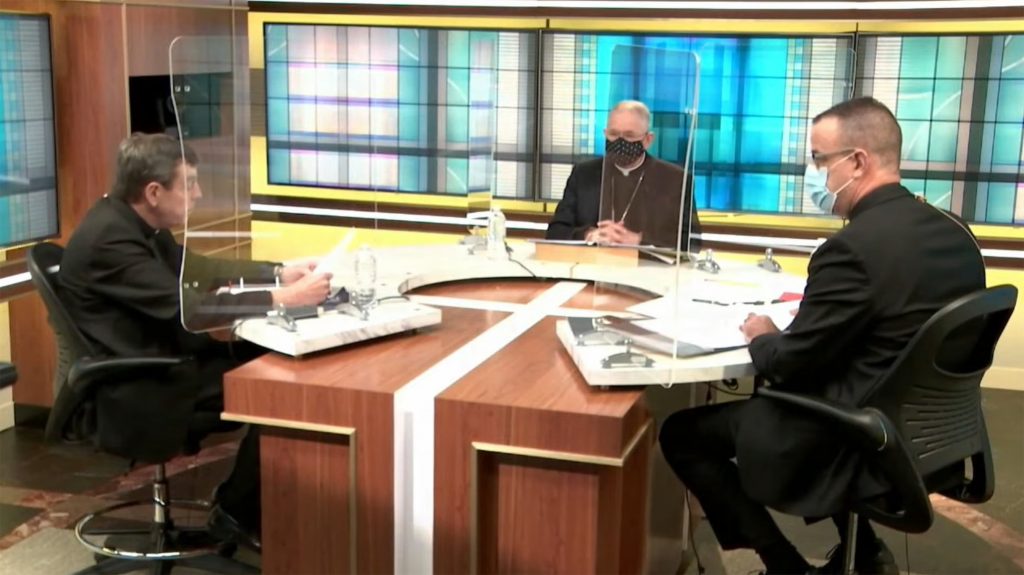Although the U.S. bishops' four-year strategic plan was adopted one year ago, it was not scheduled to go into effect until January 2021.
That gave the bishops a window to address two issues that have captured the world's attention since last November: the coronavirus pandemic and racial inequality.
Addendums to the strategic plan were approved during the Nov. 16-17 U.S. Conference of Catholic Bishops' fall general meeting being conducted entirely online.
The 193-3 vote, with two abstentions, was taken via email Nov. 16, and results were announced Nov. 17. The modifications to the strategic plan required a majority email vote of those bishops present and attending; at its peak Nov. 16, 301 bishops had logged on to the meeting.
Because of the pandemic, the USCCB Committee on Priorities and Plans did two things it said it had never done before when formulating a strategic plan for the bishops' approval.
One thing was to draft a new strategic priority for inclusion in the plan. The other, according to a report submitted by the committee to the full USCCB, was to "return the 44 already-completed, draft 2021-24 Operational Plans to committees, subcommittees and departments to allow them to make 'adjustments' to accommodate the pandemic and associated consequences."
"A strategic plan with no mention of the pandemic would not reflect the concerns of the bishops or the expected planning environment, and as such would not, and should not, be accepted," the report said.
As a result, pandemic recovery becomes a new priority, with three emphasis areas. The priority is to "promote the healing of the personal, spiritual and societal wounds of COVID-19 through the sacrificial love of Jesus Christ, the Divine Physician," the proposed language says.
The three emphasis areas are to:
-- "Foster the efforts of dioceses and parishes to recover from the destructive impact of COVID-19 upon the body, mind and soul especially among the poor."
-- "Identify new measures and assist in existing efforts to be prepared to minister effectively in the face of the next potential pandemic or existential threat."
-- "Invite the faithful to share in the triumph of the Cross over all destructive forces by encountering the Lord Jesus in holy Mass and being renewed in the healing power of the body and blood of Christ."
The May 25 killing of George Floyd in Minneapolis brought about further revision to the strategic plan, the committee report said.
"This tragic event and the public response in its aftermath left an indelible impression on the hearts and minds of citizens of the U.S. and the world. The callously cruel treatment of this man, which resulted in his death, shocked the consciences of the church, its shepherds, Catholic faithful and all humanity," it added.
Under the priority of "Life and dignity of the human person: Serve the common good as the leaven in a free society," a revised emphasis area is now proposed to read, "Work to heal the scourge of racism and religious intolerance."
"Despite starting the drafting process three months late," the proposed addendums were approved in September by both the committee and the USCCB Executive Committee, according to Archbishop Timothy P. Broglio of the Archdiocese for the Military Services, who is priorities and plans committee chairman.
The strategic plan bears the theme "Created Anew by the Body and Blood of Christ, Source of Our Healing and Hope," with the words "Created Anew" in the largest type in the logo.
The theme "acknowledges the significance of the challenges the (bishops') conference and church faces," Archbishop Broglio said. "The church will continue its efforts to restore hope" despite "the disappointments brought on by sexual abuse scandals of 2018," he added.
The archbishop said the theme should remind Catholics "of the power of the very source and summit of our faith, the body and blood of Christ, the light of the world."
The modifications to the strategic plan require a majority email vote of those bishops present and attending.

